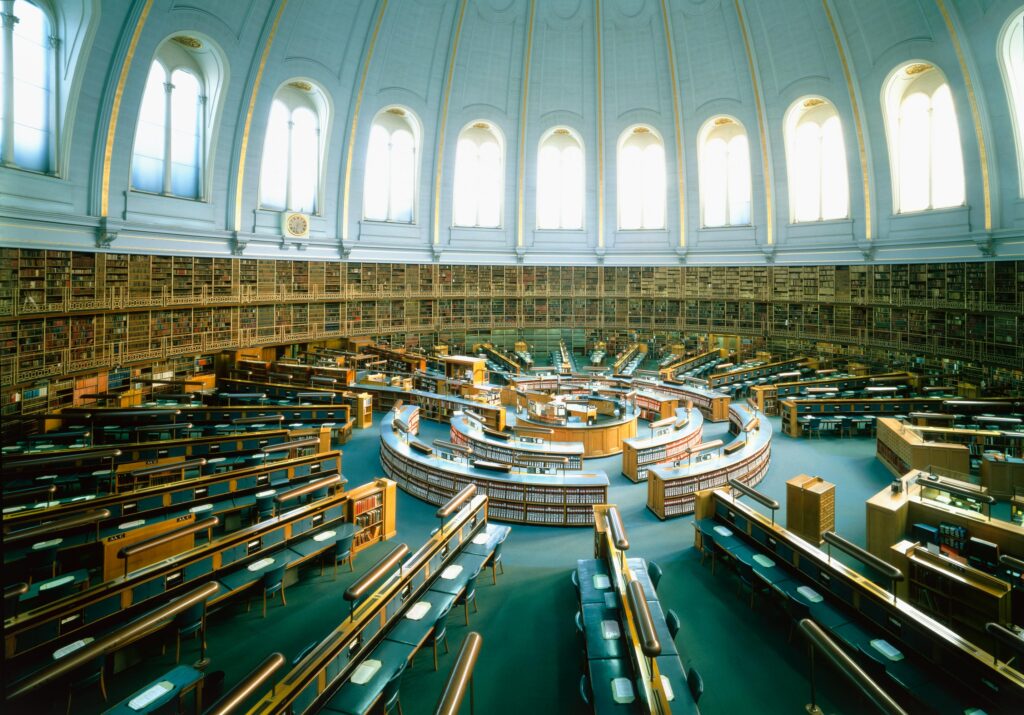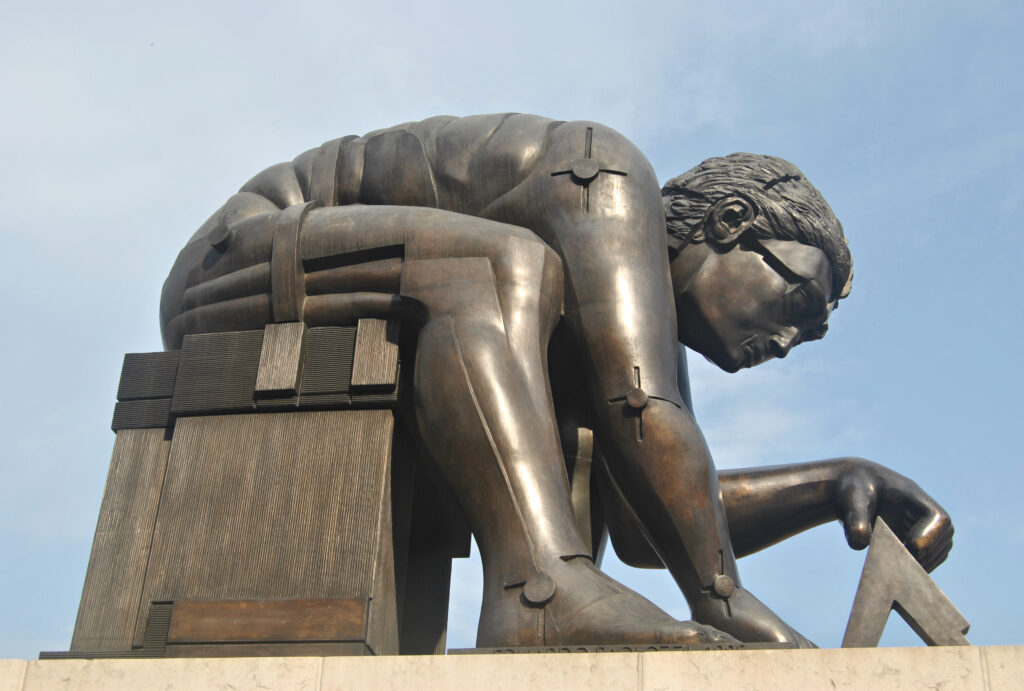by Fraser Hibbitt for the Carl Kruse Blog
A friend told me that the tube line that runs into St. Pancras station narrowly misses the foundation of the British Library. The reason for the foundations of the library being so deep in the ground is of course for storage purposes. The books in storage grow by three million a year; every newly printed book in the UK is shipped there, undergoes the various processes of labeling, and is deposited into the many kilometers of shelving for posterity. Every day books come in, and every day the tube rings by only just missing the foundation.
It is difficult to find a seat in the atrium, even if you climb the four stories; desks bordering the walls are filled with laptops and students; the cafés waver between silences of concentration and springs of giddy conversation. The library goers will fill any space with a power source, and prop themselves up against a wall. As you look down from the balconies that now face the entrance, flocks of people wander in and dart here and there around the atrium. The individual sounds funnel up into something vague; you can perhaps focus on a child’s wayward walk as they hum and stamp in and out of their parent’s grasp; an elderly man speaks with a receptionist, and there another receptionist runs along the ground, carefully evading the odd groups of people making their way.

But you have no seat so you sit against the wall in the corridor that overlooks the expanse of the atrium, and take out your work, and begin that process of finding a good thought and discarding another. A figure too lax to be called security does his rounds, and more follow looking for places to set up, or are taking the corridor for its purpose, to get to one of the reading rooms. As you sit on the floor you are prone to watch the way in which people walk through the corridor, and how their arms shape their passage: one young lady carelessly drags her fingers along the rail, and her steps fall unevenly; a man holds his coffee close to his chest and strides forth. You watch them between thoughts of work and the place you are in.
To work in a place where they keep the letter of thought so carefully gives a person much pride of task and focus. To feel they are surrounded by over three millennia of human thought, perspiration, and desire to understand the world. Still, you see the worn faces and hands raised, cradling the head in dissatisfaction; limbs stretching out in a contorting yawn. Whilst hung on the wall the busts of urbane men, sculpted in the Roman style, peer down through wizened eyes. The classical virtues, you think, if they existed, are inside this building somewhere. It is impossible, you continue, to know the letters of time so intimately as it is here, but to feel I am partaking in that, between my distracted gaze, my far-flung thoughts, requires something of me. I am merely that child I saw earlier humming and half-skipping, only I don’t realize that I am because I am looking at a marble bust.
To get up and look for another place to work, perhaps a seat is free at the exact time you have decided on getting up, is a trade-off. The constant shuffling of people means no space remains vacant. To get up is also to weave around the glass column that extends from below the ground floor up to the ceiling. Each floor rounds the perimeter of this central mast. Inside the glass column is the personal library of King George III. You spot a few titles amongst the towering bulk, like Homer’s Iliad. There are no seats or free desks this side, so you continue to circumvent the monument of books. You feel it is unlikely that there will be any free seats. It may be that in the time it took to spot the Iliad, a seat was lost and quickly found. The vellum books are kept lit in their stable home. Will anyone touch them and give them life, you think; no, they are a show piece of history; they are behind this forbidden glass and tower much to high, fall far to low. It is good to see far beyond one’s limitation, you think, and there is a great pleasure in seeing a consummate work of lives spread out before me. It enriches me somehow, gives me a desire to add a grain of sand which may one day contribute to the glass which screens history.
You also desire to have, at your command, the contents of history, to be the arcane knower, and you satisfy something in yourself by thinking you can begin to edge towards that state at this very moment. This may be because you are bitter that you could not find a seat and are now back, slumped uncomfortably against a wall, in the corridor. The corridor is a safe bet for a place to work, however inefficacious. It is too much of a neutral space to be fought over. This neutrality is the perfect place, you convince yourself, because it both opens and closes, both connects and disconnects, a space and a frame of mind. You wander, you return, and in between what you sought you find thoughts.
Of course, such poetics are out of place and there is the actual task of editing a paper. You find the thought of comparing your work to the mechanisms of the library pleasing. It is with editing that we figure out whether the raw stuff is worth holding onto; It is hard to tell what is worth keeping a hold of, and even if it is kept, whether it is the best line for that thought – it is even, you think, a sad passing when all those raw deliberations and sketches fall apart. Here in the library, they have all the books printed every year coming in, alone in the basements, ready to be plucked by the public and brought to life. The words that fall through the seams to make the work have made way to these consummates of history; nothing is forgotten. It is not that the library is without that tinge of sadness, you think; they want to gather up, preserve, almost maniacally against that sadness. The library, however, reminds you that it is necessary. The library is in some ways a consolation, and we feel at home here because it does such a better job of handling it than we.
Now that the work is edited, you can leave. It is satisfactory, although not without its pitfalls. Leaving the library, one meets the courtyard of coffee drinkers and people on the phone. It is a pleasing buffer before the traffic of Euston Road, with a flat, smooth brick surface and a gentle incline towards the road. Before you leave, you look at Paolozzi’s huge bronze sculpture, Newton after Blake, and recall Blake’s admonition to the visionary; measuring, confining and limiting, the universe at the cost of the mysterious, receptive manner of receiving its motions. Blake’s Newton was perched on rock covered with lively colors. The rock was only instrumental for his form, it spoke of something else, something raw. Newton is hunched over with his pair of compasses, unaware of the rock. His body is pressed and strained by his desire to know. Paolozzi’s sculpture takes the same form, only the body is more mechanical, bolted at the ankles, elbows and shoulders, strapped to the plinth by a metal band. At his back is no colorful rock, but the endless space of sky of the courtyard. You find it unsettling that Newton is doubled over and cannot see the sky, that a focus here is also a loss around you, that he is mechanized.

You leave through the gate with an even step thinking about the ever-expanding vault below the library and the tube that rings by, and at what time, if any, you should come next time in order to get a seat.
The Carl Kruse Blog homepage.
Contact: carl AT carlkruse DOT com
The blog’s last post was What Makes Something Humorous?
You can also find Carl Kruse over on the Goodreads site.